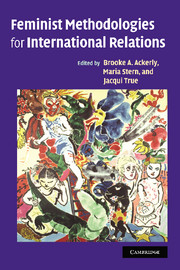Book contents
- Frontmatter
- Contents
- Notes on the contributors
- Acknowledgments
- 1 Feminist methodologies for International Relations
- Part I Methodological conversations between feminist and non-feminist IR
- Part II Methods for feminist International Relations
- Part III Methodologies for feminist International Relations
- Conclusion
- Bibliography
- Index
Conclusion
Published online by Cambridge University Press: 12 January 2010
- Frontmatter
- Contents
- Notes on the contributors
- Acknowledgments
- 1 Feminist methodologies for International Relations
- Part I Methodological conversations between feminist and non-feminist IR
- Part II Methods for feminist International Relations
- Part III Methodologies for feminist International Relations
- Conclusion
- Bibliography
- Index
Summary
When read together, the distinct and complementary chapters in this volume show how ontology, epistemology, methods, ethics, and their interconnections are vital considerations in the ways we frame our research questions, conduct our work, make sense of our findings, and envision the world. Individually, the chapters in this collection can be seen as exemplars of the theoretical rigor, analytical acuity, ethical consideration, and political work that conducting responsible IR scholarship arguably demands. Taken together, however, they are intended as inspiration to IR scholars reflecting on their own methodological choices, and as examples of how particular scholars resolve specific problems in their own research. Without intending to codify them or to offer a definitive state of the field, we conclude by highlighting several interrelated key insights from these contributions.
First, this volume illustrates how gender matters in what we study, why we study, and how we study contemporary global politics. In different ways, the contributing chapters challenge what we consider as the subjects of IR (e.g. states, security, military institutions). They suggest creative ways for reenvisioning how to study IR (e.g., through gazing at art or recording life histories), which reach far beyond the traditional confines of the discipline in order to take gender – and the interactions of gender and other power relations – seriously.
Secondly, the chapters in this volume offer fresh insights on questions of power and knowledge which have been vital to critically oriented IR scholarship and feminist interdisciplinary inquiry.
- Type
- Chapter
- Information
- Feminist Methodologies for International Relations , pp. 261 - 263Publisher: Cambridge University PressPrint publication year: 2006



